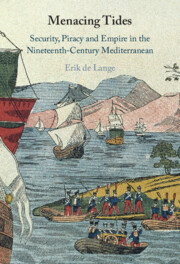2 - Opening Fire
The Anglo–Dutch Bombardment of Algiers, 1815–1816
Published online by Cambridge University Press: 11 April 2024
Summary
The Anglo-Dutch bombardment of Algiers on 27 August 1816 indicated how, after the Congress of Vienna, a new order based on collective security was taking shape, not just on the continent, but also in the Mediterranean Sea. This chapter suggests that 1816 was a moment of departure from past traditions and signified the creation of a new Mediterranean order. Defining features of that order – such as modes of cooperation, the linkage to the Congress System, the use of security as a legitimizing discourse and the important roles of smaller and non-European powers – all came into play during the Anglo–Dutch bombardment. Additionally, this Anglo–Dutch cooperation shows how various states took the lead in the fight against piracy, dependent upon the situation. There was not a single naval hegemon who executed the repressive effort. At this early stage, smaller powers initially drove the repression of ‘Barbary piracy’, later to be followed by Great Britain, Russia and France. The effort became a truly pan-European reorganisation of security in the Mediterranean.
Keywords
- Type
- Chapter
- Information
- Menacing TidesSecurity, Piracy and Empire in the Nineteenth-Century Mediterranean, pp. 56 - 107Publisher: Cambridge University PressPrint publication year: 2024

